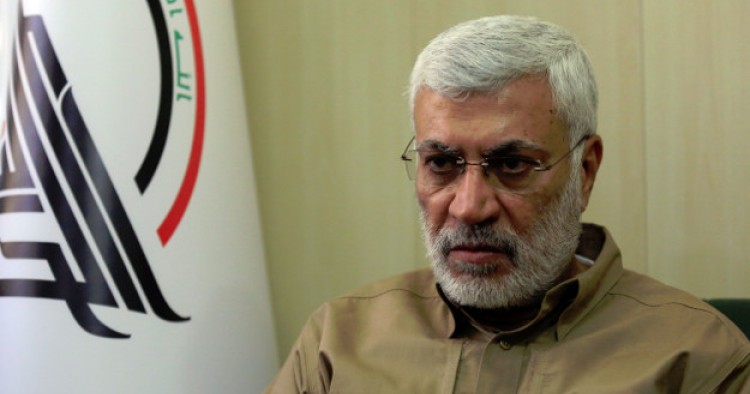Leaders of Iraqi Popular Mobilization Forces (P.M.F.) rushed to defend Abu Mahdi al-Muhandis, the paramilitary forces’ chief operational commander, after U.S. State Department Spokesperson Heather Nauert called Muhandis a “terrorist” at a press briefing on Thursday. “These remarks indicate a direct threat to Muhandis’ life and we hold America responsible for any attempt or harm to the life of the deputy head of the Popular Mobilization Forces,” P.M.F. Spokesman Ahmad al-Assadi warned in an interview with the Lebanese al-Mayadeen news outlet on Friday. “The Iraqi Foreign Ministry must respond to Washington because Muhandis holds an official position in Hashd al-Shaabi as a part of the Iraqi security forces,” he added.
Separately, Faleh al-Fayadh, Iraq’s national security advisor and P.M.F. chairman, also denounced Nauert’s comments. “Our mujahid brother Mahdi al-Muhandis, as the deputy commander of the Hashd forces, has been a defender of the country and its fate and he’s fought ISIS terrorists with honesty,” he said. “The accusations of the State Department and especially at this time are rejected and useless and we are the ones valuing our personalities not others. Our Hashd al-Shaabi will remain defenders of this country and its interests without any regard for those who reproach,” he added.
Comment: Muhandis, arguably the most influential commander within the P.M.F., is more loyal to Tehran than Baghdad. In April, he said he took a pride in being a “soldier” of Iranian Quds Force Commander Major General Qassem Soleimani, calling it “a blessing from God.” In a documentary aired on the Iranian state-run Ofoq television channel, Muhandis, reiterated his allegiance to Iran’s Supreme Leader Ali Khamenei and the principle of the “Islamic jurisprudence.” He further explained that he fights for Iran because the Islamic Republic is the “mother of the Islamic community” and “our Mecca.”
The militia commander told the interviewer that his ties with the Islamic Revolution Guards Corps (I.R.G.C.) date back to the Iran-Iraq war in the 1980s. He claimed he had fought alongside Iranian forces against the regime of Saddam Hussein and also cooperated with the I.R.G.C. against Iranian opposition group Mojahedin-e Khalq (MEK). Bragging about his fluency in Farsi, Muhandis said “Farsi is the language of the Islamic revolution” while “Arabic is merely the language of the Quran.” He recommended that when he dies he be buried in Behesht-e Zahra cemetery in Tehran, not in Iraq.
According to U.S. government accounts, Muhandis participated in the bombing of Western embassies in Kuwait and plotted assassination of the Emir of Kuwait in the early 1980s. He has been convicted in absentia by the Kuwaiti government.
Under Soleimani’s supervision in 2007, he formed a group called Kata’ib Hezbollah – also known as the Hezbollah Brigades or the Iraqi Hezbollah – and employed Lebanese Hezbollah experts to train and prepare his militiamen in guerilla warfare to attack coalition troops in Iraq. Kata’ib Hezbollah now functions under the P.M.F. umbrella. Muhandis also reportedly played an instrumental role in smuggling weapons from Iran into Iraq and distributing them to anti-coalition terrorist groups.
As a result, the U.S. Department of the Treasury designated Muhandis and the Kata’ib Hezbollah group in 2009 for having “committed, directed, supported, or posed a significant risk of committing acts of violence against Coalition and Iraqi Security Forces” under Executive Order 13438. The Treasury noted that Muhandis was an advisor to Soleimani.
Recently, Muhandis, under Soleimani’s leadership, has played a prominent role in operations against the Islamic State in Iraq. He has on several occasions thanked Iran and Lebanese Hezbollah for providing his forces with weapons, consultation, expertise and training.
Muhandis’ real name is Jamal Jaafar Ibrahimi. His family is said to have migrated from Iran to Iraq decades ago and his wife is reportedly Iranian as well.
The P.M.F. consists of militia forces largely from Shiite but also other Iraqi ethnic and religious groups. While some units within the alliance are Iraqi nationalists and follow Iraq’s top cleric Grand Ayatollah Ali Sistani, many prominent units have close ties with Soleimani. Despite P.M.F.’s diversity, it is the Iran-backed militia units within the coalition – such as Kata'ib Hezbollah, Asaib Ahl al-Haq, the Badr Organization – that are playing the most prominent role in military operations across Iraq. The alliance was formed in June 2014 following a call by Sistani to defend the Iraqi cities from the Islamic State. But as the Islamic State is on the brink of defeat, Iran-backed P.M.F. groups have recently turned their focus on rival Iraqi groups and American troops advising Iraqi security forces.
The Middle East Institute (MEI) is an independent, non-partisan, non-for-profit, educational organization. It does not engage in advocacy and its scholars’ opinions are their own. MEI welcomes financial donations, but retains sole editorial control over its work and its publications reflect only the authors’ views. For a listing of MEI donors, please click here.













